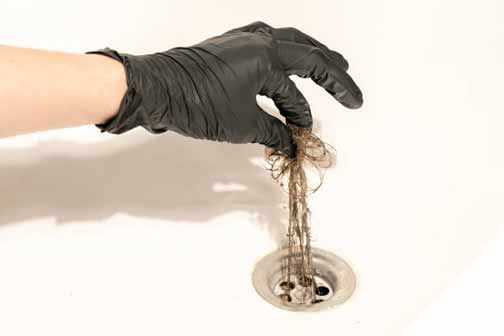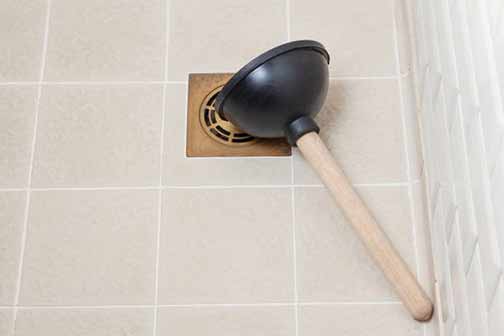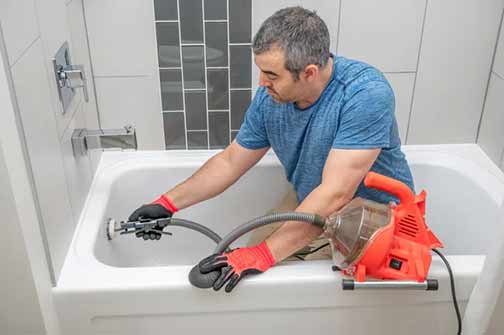
Slow shower drains can be a frustrating issue, disrupting your daily routine and potentially leading to more serious plumbing problems if left unaddressed. Identifying the root cause of a slow drain is the first step toward finding an effective solution. Below we get into the common reasons behind slow shower drains and provide insights into how professional repair services can restore optimal drainage quickly and efficiently.
Common Causes of Slow Shower Drains
Several factors can contribute to a slow shower drain. Understanding these causes can help you diagnose the issue and take appropriate action. Here are some of the most common reasons for slow drainage in showers:
Hair Buildup: A Frequent Culprit of Slow Shower Drains
Hair is one of the most common causes of slow shower drains. As you shower, hair can accumulate in the drain, creating a blockage that restricts water flow. Over time, this buildup can become significant, leading to slow drainage and even complete clogs. Regularly clearing hair from the drain can help mitigate this issue.
Soap Scum and Residue: An Overlooked Problem in Shower Drainage
Soap scum and residue can also contribute to slow shower drains. When soap mixes with water, it can form a sticky substance that clings to the walls of your pipes. This residue can trap other debris, such as hair and dirt, exacerbating the blockage and slowing down water flow. Using soap-free or low-residue products can help reduce this buildup.
Mineral Deposits: Hard Water Issues Affecting Shower Drains
If you live in an area with hard water, mineral deposits can accumulate in your pipes over time. These deposits can narrow the diameter of your pipes, reducing water flow and causing slow drainage. This issue is particularly common in older homes with aging plumbing systems. Installing a water softener can help prevent mineral buildup.
Foreign Objects: Unexpected Blockages in Shower Drains
Sometimes, foreign objects can find their way into your shower drain, causing blockages. Items such as small toys, jewelry, or even pieces of soap can become lodged in the drain, impeding water flow and leading to slow drainage. Being mindful of what goes down the drain can help prevent these unexpected blockages.
Pipe Damage: Structural Issues Leading to Slow Shower Drains
In some cases, slow shower drains can be a symptom of more serious structural issues with your plumbing system. Cracked or damaged pipes can restrict water flow, leading to slow drainage. Additionally, tree roots can infiltrate pipes, causing blockages and further complicating the issue. Professional inspection and repair are often required to address these problems.

DIY Solutions for Slow Shower Drains
Before calling a professional, there are several DIY solutions you can try to address a slow shower drain. These methods can help clear minor blockages and improve water flow.
Removing Hair and Debris from Shower Drains
One of the simplest ways to address a slow shower drain is to remove any visible hair and debris. You can use a drain snake or a wire hanger to fish out hair and other obstructions from the drain. Be sure to wear gloves and dispose of the debris properly. Regularly cleaning the drain cover can help prevent future blockages.
Using a Plunger to Clear Shower Drain Blockages
A plunger can be an effective tool for dislodging blockages in your shower drain. To use a plunger, fill the shower with enough water to cover the base of the plunger. Place the plunger over the drain and pump it up and down several times to create suction. This action can help break up the blockage and restore water flow.
Applying a Baking Soda and Vinegar Solution to Shower Drains
A mixture of baking soda and vinegar can help dissolve soap scum and other residues that may be causing a slow drain. Pour a cup of baking soda down the drain, followed by a cup of vinegar. Allow the mixture to sit for 15-20 minutes, then flush the drain with hot water. This method can help clear minor blockages and improve drainage.
Using a Chemical Drain Cleaner for Shower Drains
As a last resort, you can use a chemical drain cleaner to address a slow shower drain. These products contain powerful chemicals that can dissolve blockages and clear your pipes. However, it’s important to use these cleaners with caution, as they can be harmful to your plumbing system and the environment. Always follow the manufacturer’s instructions and consider contacting a plumber before using chemical drain cleaners.

When to Call a Professional for Slow Shower Drains
If DIY solutions don’t resolve the issue, it’s time to call a professional plumber. Professional plumbers have the expertise and tools to diagnose and fix more serious plumbing problems. Here are some scenarios where professional help is necessary:
Persistent Slow Drainage in Shower Drains
If your shower drain continues to run slow despite your best efforts, a professional plumber can perform a thorough inspection to identify the root cause of the problem. They can use specialized equipment, such as cameras and hydro-jetting equipment, to locate and clear blockages deep within your plumbing system.
Recurring Clogs in Shower Drains
Recurring clogs can be a sign of a more serious underlying issue, such as damaged pipes or tree root infiltration. A professional plumber can assess the condition of your pipes and recommend appropriate repairs or replacements to prevent future clogs.
Water Damage Caused by Slow Shower Drains
Slow shower drains can sometimes lead to water damage in your bathroom. If you notice water pooling around your shower or signs of water damage, such as mold or mildew, it’s important to call a professional immediately. They can address the drainage issue and help mitigate any water damage to your home.
Preventing Future Slow Drains
Once your shower drain is functioning properly, taking preventive measures can help keep it running smoothly. Here are some tips to prevent future slow drains:
Regular Maintenance for Shower Drains
Regularly cleaning your shower drain can help prevent blockages. Remove hair and debris from the drain cover after each shower, and periodically use a drain snake or plunger to clear any buildup. Additionally, consider using a drain cover or hair catcher to reduce the amount of hair and debris that enters the drain.
Using a Water Softener to Prevent Mineral Deposits in Shower Drains
If you have hard water, installing a water softener can help reduce mineral deposits in your pipes. A water softener removes minerals such as calcium and magnesium from your water supply, preventing them from accumulating in your plumbing system and causing blockages.
Avoiding Foreign Objects in Shower Drains
Be mindful of what goes down your shower drain. Avoid allowing small objects, such as toys or jewelry, to enter the drain. Additionally, use a soap dish to prevent pieces of soap from washing down the drain and causing blockages.
Professional Inspections for Shower Drains
Scheduling regular professional inspections can help identify and address potential plumbing issues before they become serious problems. A professional plumber can assess the condition of your pipes, perform routine maintenance, and recommend any necessary repairs to keep your plumbing system in optimal condition.
Wrapping It Up
Slow shower drains can be a nuisance, but understanding the common causes and solutions can help you address the issue effectively. Whether it’s hair buildup, soap scum, mineral deposits, or foreign objects, identifying the root cause is the first step toward restoring optimal drainage. While DIY solutions can be effective for minor blockages, plumbers are essential for more serious plumbing problems. By taking preventive measures and scheduling regular maintenance, you can keep your shower drain running smoothly and avoid future issues.

